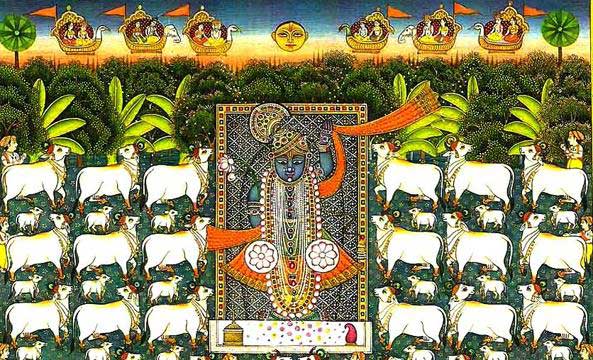Janmasthami dasa, Oct 15, 2010 — WEST VIRGINIA, USA (SUN) — Having read the recent murmurings from the mind of England’s Kripamoya das, we were stunned by their starkness.
Having opened his can of worms using a term with a multiplicity of meanings, “Hinduism”, he now has the task of trying to find a common denominator definition that everyone can agree to, at least in part. To accomplish this task, he has opened the discussion to include the opinions of the masses, as if they were of some significance from a Vedic point of view. This political poll watching, not unusual since the advent of the “replacement guru theory”, has crippled the ISKCON movement more than their misunderstanding of the position of “Guru”, especially within the organization they were left to manage.
Kripamoya prabhu boldly speaks of “our ISKCON members”, but his own organization that he purports to represent has failed miserably after four years of costly meetings and debate to even be able to define what “ISKCON members” are, and what their rights and their obligations as such should be. He seems to have found a very recently developed class of advanced Vaishnava devotee, those who “consider capitalism the only way forward”, and we await further enlightenment on just whom he sees such “advanced Vaishnava qualities” in, and the glorious tales of the exploits of these modern day saints that walk amongst us. Hopefully, the financial cesspool that the Vedic planetarium has become will not be their role model of choice. Let us warn them here of that in advance. And the Mumbai billionaires mafia assembled by Kirtanananda, inherited by Radhanath, has shown signs of the wear and tear of having to change political loyalties as often as they have had to. Let that not be a “source of pride” for any offering the path of most direct success.
He also has a class of devotees that he associates with “the devotees who want to live a peaceful, quiet existence where they can chant and study free from any social responsibilities”, and he seems to hold that such an existence, at the temple’s expense, is “an acceptable lifestyle choice”. While it may be “an acceptable lifestyle choice” for some, those “some” must never be maintained at the expense of the preaching mission. This is an example of the REMF mentality that has come to corrupt the once pristine organization. “Even if they were wrong, they were right.” That magic has been lost, post-Samadhi, most agree on that; the assigning of blame has been a little less easy to find points of agreement on.
While making provisions for his “capitalist devotees” and those dedicated to a Mayavadi oriented approach to the scripture concerning the preaching nature of this movement, he has noted the apparent oversight in the ISKCON succession theories and it’s catastrophic affect on the second generation’s participation in the ISKCON they find themselves faced with. Kripamoya has told us: “Personally, I feel a movement such as ours requires all types of persons, and requires them to be all highly committed to their respective visions. Only that will produce the practical results we need for the next generation of devotees. Getting to the next generation is the challenge, of course.”
It is clearly not the ISKCON of their youth and while they may wonder where that glow has gone, no one in ISKCON these days can even relate the tales of those times without the intervention of some “my guru is better” automatron from the current cadre of available ISKCON acaryas. This neophyte insolence is allowed by these political opportunists that have used their “time/space proximity” to A Great Soul, Srila Prabhupada, to try to enhance their own credentials as spiritualists. “And they have brought their caste brahmin status cards with them for proof!” And they wonder why some of the next generation has their reservations about accepting their “already known to be faulty”, spiritual advice. Such are the times.
Kripamoya has also told us that “diverse people can be intelligently joined together to create a vibrant society”, and we can understand conversely that a society that is not “vibrant” cannot be intelligently led. What are we to do when faced with these challenges to our KRSNA consciousness? How to deal with an organization that is no longer receptive to the real needs of the society at large, what to speak of “their members”? Who are not “members”?
We invite Kripamoya prabhu’s continued enlightenment on such matters.








Speak Your Mind